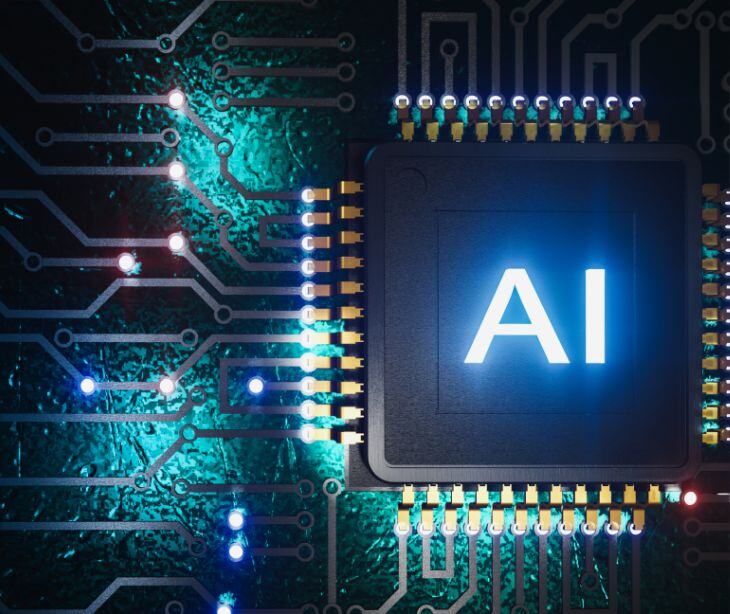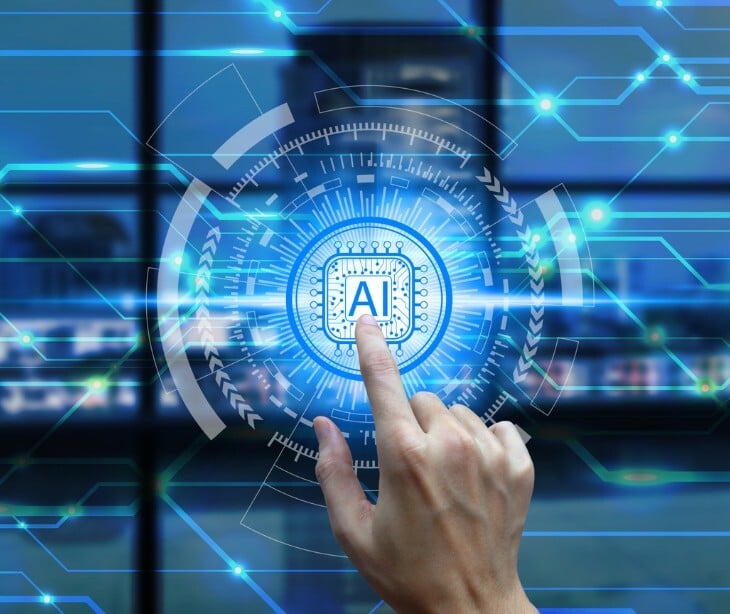4 min read
AI in healthcare privacy: Enhancing security or introducing new risks?
Tshedimoso Makhene
March 13, 2025

While AI offers significant advancements in protecting sensitive patient information, it also introduces new vulnerabilities that could be exploited by cybercriminals.
The growing importance of AI in healthcare
AI is revolutionizing various aspects of healthcare, from predictive analytics and robotic-assisted surgeries to personalized medicine and automated administrative tasks. One of its most pivotal
applications is in data security and privacy. AI-driven solutions promise to enhance data security by detecting anomalies, preventing breaches, and automating compliance with healthcare regulations such as the Health Insurance Portability and Accountability Act (HIPAA) and the General Data Protection Regulation (GDPR).
Read also: The intersection of GDPR and HIPAA
How AI enhances healthcare privacy and security
Threat Detection and Prevention
“Due to its ability to evaluate security threats in real-time and take appropriate action, artificial intelligence has emerged as a key component of cyber security,” writes Mohammed Rizvi in his study titled Enhancing cybersecurity: The power of artificial intelligence in threat detection and prevention.
Traditional security measures rely on predefined rules, making them less effective against evolving threats. AI, however, continuously learns from new data, allowing it to detect and mitigate threats before they cause harm.
Automated compliance monitoring
Healthcare organizations must adhere to stringent privacy regulations, often requiring constant monitoring and reporting. AI simplifies compliance by automatically analyzing data access logs, detecting policy violations, and generating reports for auditors.
A study titled “Adapting to Artificial Intelligence Radiologists and Pathologists as Information Specialists” states that "Artificial intelligence has the potential to revolutionize healthcare compliance by automating the monitoring and enforcement of regulations, reducing human error, and increasing efficiency. AI systems can analyze vast amounts of data to identify patterns and anomalies that may indicate non-compliance, ensuring that healthcare organizations adhere to regulations such as HIPAA."
Secure data sharing
Interoperability in healthcare requires secure data sharing among hospitals, clinics, and research institutions. According to healthcare leaders, technologists, and policymakers who attended ViVE 2025, interoperability is important to healthcare and secure, seamless data-sharing networks remain a top priority.
AI-driven encryption and blockchain technologies ensure that patient information is securely transmitted without unauthorized access. AI can also verify user identities, granting access only to authorized personnel while minimizing risks associated with human error.
De-identification and anonymization of patient data
AI is used to de-identifying patient data for research and analysis. By removing personally identifiable information (PII) while retaining valuable health insights, AI allows researchers to use patient data without compromising privacy. This method enables advancements in medical research and public health initiatives while safeguarding sensitive information.
Fraud prevention
AI enhances fraud detection by analyzing billing patterns, identifying anomalies, and preventing fraudulent claims. Healthcare fraud, such as billing for unperformed services or misrepresenting diagnoses, leads to financial losses and privacy risks. AI systems can flag suspicious claims in real-time, reducing fraudulent activities and protecting patient data integrity. According to Oluwabusayo Bello of Illinois State University and her colleagues, “Machine learning algorithms, particularly supervised learning models like decision trees and neural networks, are used extensively to identify fraudulent transactions by learning from historical data. These models can distinguish between legitimate and fraudulent transactions by recognizing subtle patterns that might be missed by traditional rule-based systems.”
Risks and challenges of AI in healthcare privacy
While AI offers significant privacy and security advantages, it also introduces several risks and challenges that healthcare organizations must address.
Data breaches and hacking risks
AI systems require vast amounts of data to function effectively. If these AI models are not properly secured, cybercriminals can exploit vulnerabilities to gain unauthorized access to sensitive patient information. AI-driven security solutions themselves can become targets for sophisticated cyberattacks, putting patient data at risk.
Read also: Healthcare data breaches: Insights and implications
Bias and discrimination in AI algorithms
AI models learn from historical data, which may contain biases. If AI-driven security systems or risk assessments are trained on biased datasets, they can inadvertently discriminate against certain patient groups. For instance, AI might flag specific demographics for increased scrutiny, leading to disparities in access to healthcare services.
Read more: Addressing discrimination in AI
Privacy concerns with AI-powered data analysis
While AI can anonymize patient data, the process is not foolproof. Advanced de-anonymization techniques can re-identify individuals from supposedly anonymous datasets, posing privacy risks. A Scientific Reports study published by Kai Packhäuser, et al. showed that a “well-trained deep learning system is able to recover the patient identity from chest X-ray data.”
Additionally, healthcare organizations must ensure that AI tools comply with ethical guidelines regarding patient consent and data usage.
Over-reliance on AI and reduced human oversight
“Organizations may make the mistake of overlooking the ongoing need for hands-on employee training because they rely too heavily on machine automation,” writes Perry Carpenter in a news story published by Security Magazine in February 2024.
This mistake allows for AI-driven security solutions to create a false sense of security, leading organizations to reduce human oversight. However, AI is not infallible; it requires continuous monitoring and updates to address emerging threats. A lack of human intervention can result in undetected vulnerabilities, making healthcare systems more susceptible to cyberattacks.
Regulatory and ethical challenges
The adoption of AI in healthcare has raised regulatory and ethical concerns. Current privacy laws may not fully address AI-related risks, leaving gaps in data protection policies. Ethical considerations, such as patient consent for AI-driven diagnostics and data usage, must also be carefully managed to maintain public trust.
Read more: Using AI for HIPAA compliance
Best practices for implementing AI in healthcare privacy
To maximize AI’s benefits while mitigating risks, healthcare organizations should adopt best practices for AI implementation in data privacy and security.
Adopt robust AI security measures
Healthcare institutions should implement multi-layered security frameworks that include encryption, access controls, and continuous AI model training to detect evolving threats. Regular security audits and penetration testing can identify vulnerabilities before they are exploited.
Ensure AI transparency and explainability
AI algorithms should be transparent and interpretable to avoid biased decision-making and privacy violations. Explainable AI (XAI) allows healthcare providers to understand how AI models arrive at specific conclusions, ensuring accountability and fairness.
Strengthen data governance policies
Organizations must establish clear data governance policies, defining how AI processes patient information, who has access, and how long data is retained. Implementing strict access controls and monitoring AI interactions with sensitive data can reduce privacy risks.
See also: The GRC influence on healthcare
Enhance workforce training and awareness
Healthcare professionals should receive training on AI-driven security solutions, understanding their capabilities and limitations. Awareness programs can educate staff on recognizing phishing attacks, insider threats, and AI system vulnerabilities.
Related: What is cyber-preparedness?
Align AI implementation with regulatory compliance
AI tools should be designed to comply with existing healthcare privacy regulations. Organizations must collaborate with regulatory bodies to ensure AI-driven security measures align with evolving legal frameworks.
See also: HIPAA Compliant Email: The Definitive Guide
FAQS
How does AI improve privacy and security in healthcare?
AI enhances healthcare privacy by detecting cybersecurity threats, automating compliance monitoring, encrypting sensitive data, and enabling secure data sharing through blockchain and identity verification technologies.
Can AI prevent healthcare data breaches?
AI can significantly reduce the likelihood of data breaches by identifying suspicious activities, automating access controls, and responding to cyber threats in real-time. However, no system is entirely foolproof, and AI itself can be a target for cyberattacks.
Can AI-powered healthcare security solutions be hacked?
Yes, like any technology, AI-driven security systems can be vulnerable to cyberattacks if not properly secured. Hackers may exploit weaknesses in AI algorithms or use adversarial attacks to manipulate AI-based threat detection systems.
Subscribe to Paubox Weekly
Every Friday we bring you the most important news from Paubox. Our aim is to make you smarter, faster.




